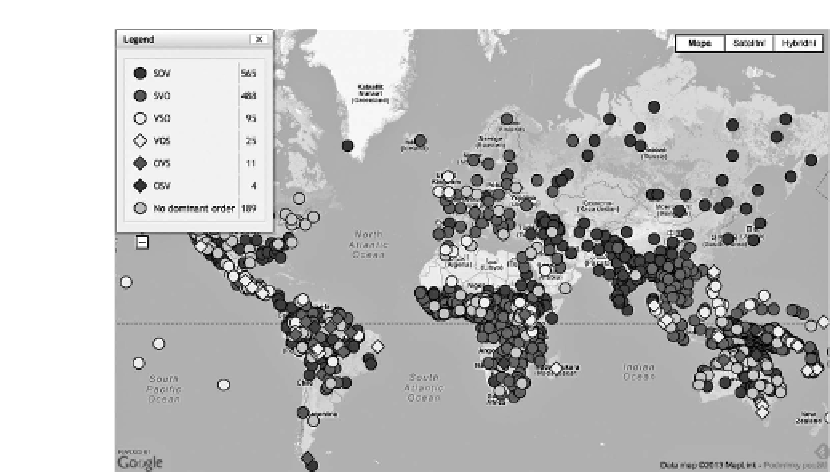Information Technology Reference
In-Depth Information
FIGURE 2.3
Order of Subject, Object and Verb. Source:
http://wals.
info/feature/81A?z1=2435&v2=cd00&v1=c00d&s=20&v3=cff0&v4=
dff0&v5=dd00&v6=d00d&v7=cccc&z5=2989&z6=2996&z7=2811&z4=
2975&z2=2512&z3=2905&tg_format=map&lat=31.653381399664&lng=
8.7890625&z=2&t=m
, cit. 2013-05-01. Reprinted with permission from Matthew Dryer
and Martin Haspelmath.
the command-line (user) interfaces (CLIs). The model used is subject-verb-object, or
SVO, which follows the natural word order of the English language.
The most important part of such a linguistic model is, however, the verbal phrase,
the subject being the user interacting with the computer. Or, as Nadin put it, “as soon
as we interpret a sign, we become part of it for the time of that interpretation” (Nadin,
1988, p. 271). The user, by interpreting the sign, connects to the sign interpretant to
decode the intended meaning.
As mentioned before, the differences among linguistic models of different lan-
guages also dwell in the order of adverbs (e.g., in English, manner, place, frequency,
time, purpose [Capital Community College Foundation, 2005]). We suggest that fol-
lowing the natural adverb order in the UI would benefit the user's mental model and
thus the overall usability. The adverb order can structure the sequence (narration)
of the UI interaction, together with the distinction between theme/rheme, old/new
information, and background/focus. The adverb order can be seen, for example, in a
wizard-based discourse (when we are booking a flight on the Web, we are presented
with choices: From what origin? To what destination? When? How many travelers?
etc.) (see Figure 2.4).
We argue the user's native language determines his or her mental models (i.e.,
typical way of thinking). Here, we refer to the linguistic relativity theory (Sapir-Whorf
hypothesis), which maintains that each language can perpetuate or “predetermine for
us certain modes of observation and interpretation” (Sapir, 1949, p. 11; see also
Nisbett, 2004). In other words, “users of markedly different grammars are pointed








Search WWH ::

Custom Search